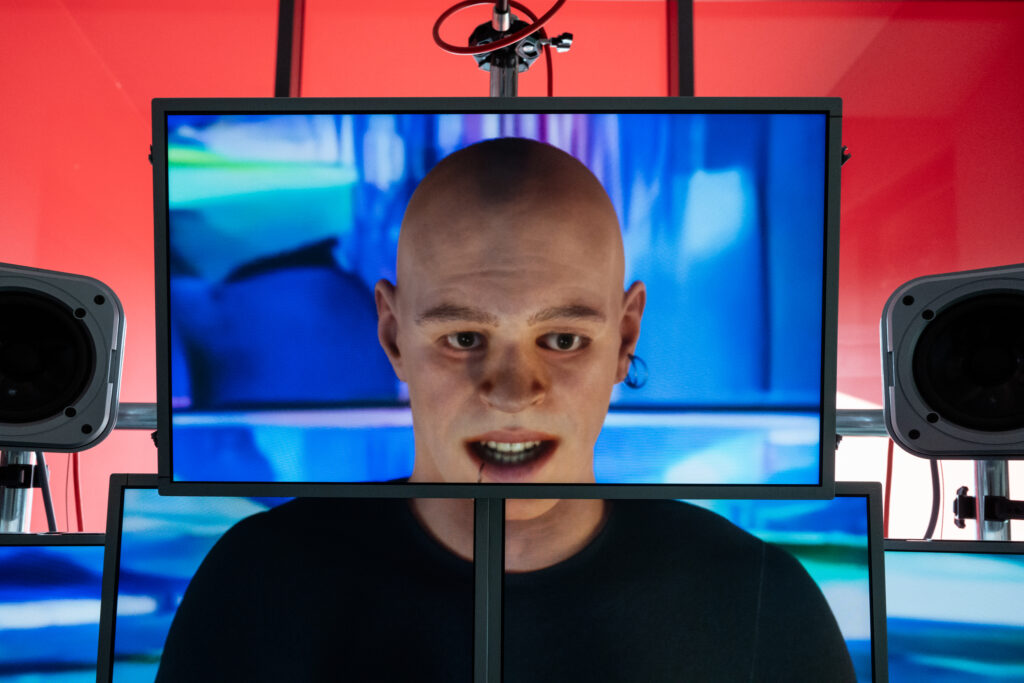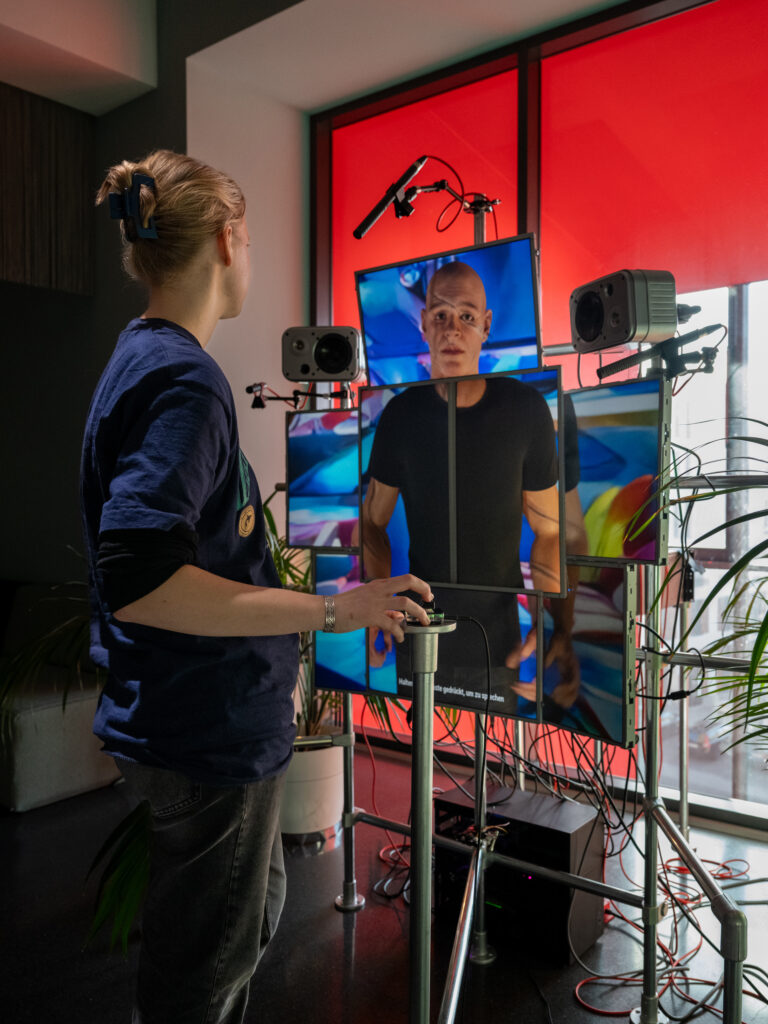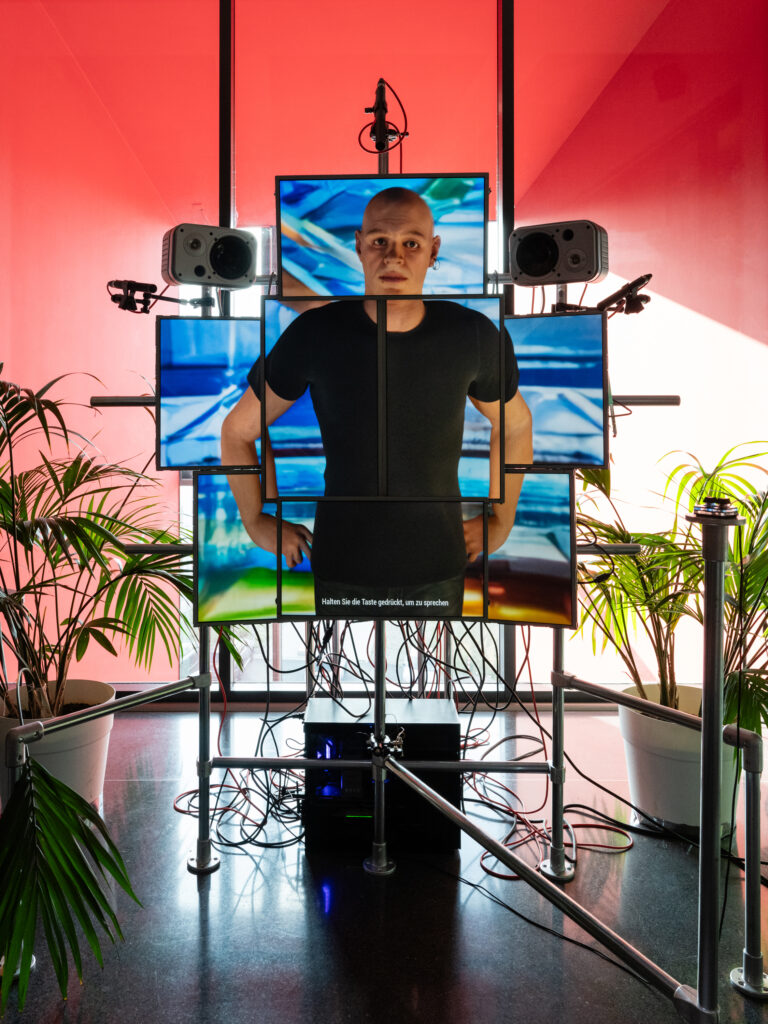RELATE - Talk With Me
The project „Relate – Talk with Me“ highlights the growing presence of artificial intelligence (AI) in our daily lives, exploring how our relationship with technology shapes our relationships with others. The interactive video installation invites the audience to engage in a conversation with a custom voice bot, represented by an avatar. Much like a chance encounter on a park bench, the exchange can be friendly, trivial, unsettling, or thought-provoking.
While Andrea Familari in his previous work, explored randomness in human relationships, with „Relate: Talk with me,“ he examines the boundaries and preconceived notions in relationships mediated by technology.
The rise of AI-based assistants like Siri, Alexa, and Google Assistant has introduced a new form of human-computer interaction. These systems answer our questions, help us organise our daily lives, and, in some cases, even provide emotional support. Yet, alongside the abundant benefits of AI-based systems, there are critical discussions around the associated risks as well: for example, of algorithms perpetuating discrimination and prejudice—whether through biased datasets, lack of diversity among developer teams, or the exclusion of non-digital knowledge forms.
Moreover, when training a bot to learn our preferences and communication styles, we also enter into a feedback loop: As the bot increasingly meets our expectations for service, it may at the same time reinforce our self-image and worldview. This could impact our ability to handle the unexpected, to improvise, or to navigate conflicts—ultimately affecting how we learn and form relationships.



These interactions raise important questions about the nature of human relationships and the role technology plays in shaping them. How do bots create the illusion of human connection? What habits do we develop in interacting with this technology? How does this dialogue influence our perceptions of ourselves and others? And can a bot be designed to challenge our biases and spark curiosity?
The installation centers around the voice bot to investigate dialogue as the core of relating. In order to establish and simulate connection with the audience, Familari lends a part of his own identity to the bot, using a 3D avatar based on a scan of himself. Together, the artist and audience participate in an experiment, observing how their interactions with the machine differ from those with humans and exploring where the lines between the two begin to blur.
The project is supported through the „Neue Künste Ruhr“ project funding, with financial backing from the Ministry of Culture and Science of the State of North Rhine-Westphalia. The bot is based on technology from NLX.AI and was developed at the Akademie für Theater und Digitalität in Dortmund with valuable inputs from Lucie Flek at the University of Bonn and Lamarr Institute, and Jonathan Harth at the University of Witten/Herdecke. The avatar was designed in collaboration with Joaquina Salgado. „Relate – Talk with me“ is the first phase of the „Relate“ project, which aims to understand the dynamics between humans and AI.
Avatar Design and Unreal Programming: Joaquina Salgado
Voice Actor: Lina Rabea Mohr
Additional Programming: Gungor Kocak
Contributors: Lucie Flek (University of Bonn and Lamarr Institute),
Jonathan Harth (University of Witten/Herdecke)
Project Overview and Text: Anasha Petersen
Bot: Based on NLX.AI technology
Development: Developed at the Academy for Theatre and Digitality
Supported by the project funding “Neue Künste Ruhr.”
Financially supported by the Ministry of Culture and Science of the State of North Rhine-Westphalia.
Presented at:
uzwei im Dortmunder U, Dortmund
19.10.24 – 02.02.25 – Link 19
Link
Contributions
"Relate - Talk with Me": Exploring the Frontiers of Human-AI Interaction by Prof. Dr. Lucie Flek
Familari’s thought-provoking installation “Relate – Talk with Me” explores the complex and evolving landscape of human-AI relationships, inviting participants to engage with and
critically examine the future of social interactions in an increasingly AI-driven world.
As researchers in Natural Language Processing (NLP) we have strived to enhance machine conversation abilities, aiming for more fluent, natural, and human-like interactions. Progress was gradual, focusing on small milestones such as grammatically correct responses and topical relevance. However, recent advancements have led to a paradigm shift, with AI systems now capable of communicating in ways that are remarkably fluid and seemingly organic. This leap forward has blurred the lines between human and machine interaction, creating scenarios that were once confined to the realm of science fiction. Children now spontaneously confide in virtual companions, while adults discuss deeply personal matters with AI interfaces that were never designed to provide emotional support or empathy. This phenomenon of impersonification raises profound questions about the nature of human-AI relationships.
Familari’s installation prompts us to consider: To what extent should we anthropomorphize AI? Should these systems be imbued with opinions, emotions, or the capacity for empathy? Do we, as humans, truly desire AI that can ponder our worldviews, relate to our emotions, or engage with our daily concerns? As we push the boundaries of technical limitations, how close are we to developing machines that genuinely care? And if we succeed, can we trust the authenticity of an AI’s curiosity when it becomes indistinguishable from human interaction?
“Relate – Talk with Me” goes beyond mere speculation, offering a hands-on experience that allows visitors to explore these questions in real-time. By engaging with the installation, participants can anticipate and critically reflect on potential future scenarios in human-AI dynamics. This interactive approach encourages a deeper understanding of the ethical, social, and psychological implications of our increasingly intimate relationships with artificial intelligence.
The installation raises important considerations about the safety of AI designs. As AI systems become more sophisticated in mimicking human conversation and emotional responses, there’s a growing need to establish ethical guidelines and safeguards to protect users, especially vulnerable populations such as children and individuals seeking emotional support. While Familari’s work also highlights the potential benefits of advanced AI interactions, such as increased accessibility to companionship for isolated individuals, it simultaneously underscores the importance of maintaining a clear distinction between AI assistance and human relationships.
Familari’s timely and provocative work serves as a crucial platform for dialogue and exploration in the rapidly evolving field of human-AI interaction. By providing a tangible experience of potential future scenarios, Familari’s installation encourages visitors to actively participate in shaping the ethical and social frameworks that will guide our relationships with AI in the years to come. It challenges us to critically examine our expectations, desires, and concerns regarding the role of AI in our social and emotional lives, ultimately contributing to a more informed and nuanced approach to the development and integration of AI technologies in society.
"Relate - Talk with me" by Dr. Jonathan Harth
The project „Relate – Talk with Me“ highlights the growing presence of artificial intelligence (AI) in our daily lives, exploring how our relationship with technology shapes our relationships with others. The interactive video installation invites the audience to engage in a conversation with a custom voice bot, represented by an avatar. Much like a chance encounter on a park bench, the exchange can be friendly, trivial, unsettling, or thought-provoking.
The Primordial Social Situation in the Digital Age
Andrea Familari’s installation focuses on the most fundamental of all social situations: face-to-face interaction. But something is different: you’re not facing another human, but a virtual agent. Non-verbal communication, facial expressions, gestures – all of these flow into this unique encounter. By transferring this primal social situation into the context of human-AI interaction, Familari creates a space for reflection on the present and future of interpersonal relationships.
The installation works with and on Goffman’s concept of the “interaction order,” which analyzes the microstructures of social encounters. In Familari’s work, this order is renegotiated as humans interact with an AI-controlled avatar. The installation thus raises questions: How do the rules and expectations of social interaction change when one of the actors is an AI? Are new orders of interaction emerging here, or are they aligning with the orders among humans?
A special feature of “Relate – Talk with me” is the inclusion of non-verbal communication through the embodied avatar. The installation makes it clear how facial expressions, gestures, and body posture play a central role and how these influence our perception and behavior. Humans are still superior in this regard: micro-expressions in gestures and facial expressions, body postures, and body arrangements in space are important indicators for interpreting social situations and can only be rudimentarily “read” or produced by current virtual agents. But what happens when this asymmetry in the interaction order dissolves, and embodied AIs can interpret our physical expressions just as well –or even better?
The Turing Test: Trust and Relationship Building in Human-AI Interaction
Familari’s installation also allows us to observe the process of getting to know and building trust between humans and AI. Here, it becomes obvious that trust plays an essential role in building relationships: How does trust develop in a context where one of the interaction partners is not human? What roles do expectations and previous experiences play in this process? How quickly can relational bonds be formed between humans and machines? What implicit and explicit expectations do we have for these new relationships? How does this compare on the side of the virtual agent? A fascinating aspect of the installation is the possible tendency of visitors to treat the interaction as a kind of informal Turing test. We still quickly find limits in the “social performance” of virtual agents. They misunderstand differently or more quickly than we humans do. But why is this boundary experience so interesting? This raises a series of elementary questions:
- Why do we tend to “test” AI systems, while we rarely do this with humans?
- To what extent does this testing mentality influence the authenticity and quality of the interaction?
- What happens when this is reversed, and virtual agents begin to test us for “humanity”?
- What happens when AI systems begin to say “no” or make their own demands?
Familari’s installation “Relate – Talk with me” thus functions as a live laboratory for the future of social interactions. It allows us to test, anticipate, and critically reflect on potential developments in human-AI relationships. The installation illustrates that we are on the threshold of a new era of social interaction, in which the boundaries between human and machine are increasingly blurring.